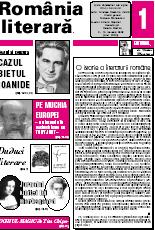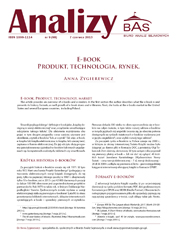Отговор на осъзнатата необходимост от макроикономически анализ и прогнозиране
Reference to Ст. Тонкова, П. Горанова. Модели за макроикономически анализ и прогнозиране. В. Търново, ИПК “Св. Евтимий Патриарх Търновски”, 2000.
More...We kindly inform you that, as long as the subject affiliation of our 300.000+ articles is in progress, you might get unsufficient or no results on your third level or second level search. In this case, please broaden your search criteria.
Reference to Ст. Тонкова, П. Горанова. Модели за макроикономически анализ и прогнозиране. В. Търново, ИПК “Св. Евтимий Патриарх Търновски”, 2000.
More...
SCIENTIFIC LIFE: Information about a scientific conferense 'Bulgarian Economy — Challenges of the Transition', held on 2 November 2001 in Sofia.
More...
The last article written by the author for România literară before he died. The author writes about the publication of Caragiale's "Opere" by Editura Univers Enciclopedic.
More...
In issue no. 44 of 2001, România Literară published (after The New York Review of Books) an extended text about Romania written by the American political philosopher Tony Judt. This text was accompanied by an editorial comment. Tony Judt's text determined strong remarks in the whole Romanian media. România Literară publishes now an interview with Tony Judt (with D.R.Popa).
More...
The article begins with the slogan of a Romanian TV station "Acasa TV" (Home TV) which says: "Locul tău e acasă" (Your place is at home). The author says that although the message is scandalous, it is in concordance with the traditional clichees that are yet functioning in Romania according to which the women sit at home and raise the children. The author discusses about the telenovelas (the soap operas) that are very popular in a certain segment in Romania and the characters in these telenovelas, as well as about a TV broadcast called "De 3 ori femeie" (Three Times a Woman).
More...
This article provides an overview of e-books and e-readers. In the first section the author describes what the e-book is and presents its history, formats, as well growth of e-book stores and e-libraries. Next, she looks at the e-books market in the United States and several European countries, including Poland.
More...
The paper describes the social composition of the Hungarian parliament at the beginning of the 20th century. Research has found no discernible social differences among the various groups of the political elite the sociological character of which did not significantly differ. Taking this as a starting point we provide a statistical analysis of the members of parliament. We used national assembly data from 1901 and 1905 to carry out the comparative analysis of the members of parliament coming from different political backgrounds. We processed the database – containing nearly 600 members of parliament elected on these two occasions and 34 statistical variables for each – with the SPSS program. As a result, we could provide a statistical basis for the former findings of social historiography. According to our study, the social composition of the two parliaments of 1901 and 1905 were not significantly different, the political elite was sociologically uniform. Though the outcomes of the two elections were dominantly different, this was not discernible in the statistical indicators. The traditional political elite, the aristocracy and the former nobility were heavily represented in the parliament. The vast majority of the members of parliament had university degree, primarily from law, while intellectuals from other important fields of economy and culture were almost completely missing from the traditionally lawyer- dominated national assembly. When it came to political career, graduation in Budapest was an important factor. Two thirds of the members of parliament had spent some time in central government or local government administration before embarking on a career in politics.
More...
One of the major experiences of those who survived the First World War was the experience:“The soldiers are singing!”. This is especially (but not exclusively) true for the first days of the war and the enlistment period. Soldiers’ songs were an integral part of the cultural traditions of 19th-century men. The war changes the conditions of life not only for the members of the army but also for the whole society by recruiting a major part of the male population. Former soldiers’ songs may pick up additional meanings and new songs may be composed. Our study of soldiers’ songs from the First World War (that is those that were sang or collected at the time) shows that beside hatred, the defense of the country and putting the blame on the enemy, the main topics are conceit, manliness and courage. We have to remember that the army was traditionally seen as the symbol of transition from boy to man, the former members of the armed forces were to become full – male – members of the local communities. Despite the fact that the majority of the songs sung in the First World War was connected to past events, primarily to the War of Independence of 1848–49, it seems that, unlike in Germany, self-sacrifice in the war became a less organic part of the national ideology in Hungary. The main topics are parting, being far away and the relations to the mother and the lover. I believe that the momentum in the War that created a sense of national identity was mourning and loss and not the myth of heroism.
More...
The 19th century was eventful in both Spain and France. Although the diplomatic relations of the two countries had less and less to do with the “good neighbourhood” principle, the bordering zone of the Pyrenees always offered an asylum and a logistic base for those who were prosecuted by the regime, whether liberals under Ferdinand VII, royalists during the Liberal Triennium (1820–1823) or Carlists during the three Carlist Wars. Moreover, during the last Carlist War (1872–1876) the French, disappointed by the Empire and frightened by the Commune, showed a kind of sympathy towards the exiled Monarch whom they regarded as legitimate, and despite the diplomatic pressure from Madrid for the prosecution and deportation of the Pretender’s supporters in the name of good neighbourhood, Paris and the French local authorities – including some notables, aristocrats and clergymen – received them with a kind of indulgence or even sympathy.
More...
The aim of this study is to outline the Hungarian connections of the Augustineum (Caesareo- Regium Sublimioris Presbyterorum Educationis ad Sanctum Augustinum Institutum Viennense, in Hungarian: Szent Ágostonról nevezett Bécsi Felsőbb Papnevelő Intézet), a special institution of ecclesiastical elite education of the Austro-Hungarian Monarchy. This task is very important. Neither the history of the Augustineum, nor the role it played within the Monarchy can be discussed without an analysis of the Hungarian contribution. During the existence of the institution between 1816 and 1918, 372 students were admitted from the dioceses of the Holy Hungarian Crown. This amounts to about 35% of the total number of students.The number of Latin-Rite students was 321. Among these, the Province of Esztergom was represented by 146 persons, the Provinces of Kalocsa-Bács and Zágráb by 118 (61 from Croatian dioceses), and the Province of Eger by 43. There were also 14 monks studying largely at their own expense. The number of students of the Greek Rites was 51. In the selection of the students the archbishop of Esztergom as the prince-primate of the country played a fundamental role. After the first decades of a different practice, he was the only one who could make a proposal to the monarch for the admission of new students. Yet the dioceses of the country were represented in appropriate proportions. The slightly overrepresented status of the Province of Esztergom (and the arch-diocese, 35 persons) can be explained by the fact that its seminar in Vienna, the Pazmaneum, provided suitable and readily available people for studies in higher education. The Hungarian contribution to the operation of the Augustineum was proportionate to the number of Hungarian students. [....]
More...